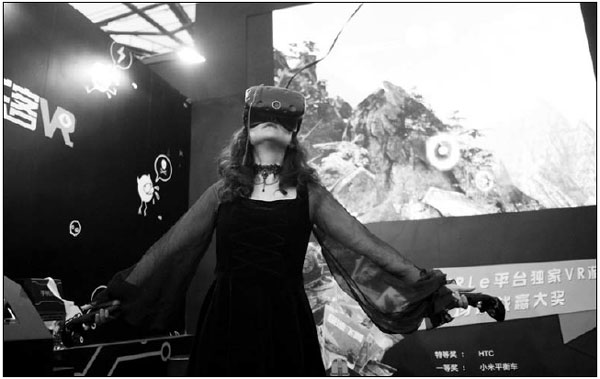Anti-piracy, plagiarism fair game at entertainment expo
Discussions about intellectual property protection for China's mobile gaming industry dominated discussions among industry insiders attending this year's 14th China Digital Entertainment Expo, also known as ChinaJoy 2016, which ended on July 31 in Shanghai.
Talks at the event revealed a growing demand for anti-plagiarism and anti-piracy initiatives in the industry, People's Daily reported.
The four-day event attracted record crowds, with more than 320,000 visitors watching and experiencing in excess of 4,000 mobile games showcased by exhibitors from over 30 countries and regions.
Sun Shoushan, deputy chief of the State Administration of Press, Publication, Radio, Film and Television, said during the expo that China's mobile gaming industry generated 140.7 billion yuan ($21.2 billion) in sales revenue last year, recording an average annual growth rate of 34 percent over the past five years.
Despite the fast-growing market, Sun said the domestic industry is facing a number of challenges, including low innovation capacity, weak international competitiveness and lack of classic works.
Commenting on the nature of mobile games in the Chinese market, Sun said many are developed based on similar themes and generally lack the playability necessary to hook gamers. He added that IP problems, such as piracy and copycats, still exist.
"The low cost of research and development is one of the main reasons for the rampant infringements in mobile games, which results in the influx of a large number of small- and medium-sized companies," Zhao Zhanling, a legal adviser with the Internet Society of China, told The Economic Observer.
"For them, money and survival are more important than copyrights," he said.
In addition, the income from illegal operations usually exceeds compensation rulings issued by courts, which also adds to the difficulty in curbing such infringements, Zhao added.
Tencent Games, which is part of China's internet giant Tencent, moved to establish a special team to safeguard the IP rights of its mobile games. Last year, the team filed more than 100 lawsuits involving trademarks, copyrights and unfair competition in large cities such as Beijing, Shanghai and Shenzhen.
Mao Xinliang and his team, which produced Fight For Freedom, also hired a professional company to conduct worldwide patent layout for the mobile game, which boasts eight patented technologies.
Unlike Tencent Games and Mao's team, many startups in the industry pay little attention to IP protection and patent application, which could make it difficult for them to prove the originality and prior use of their inventions when disputes arise, experts said.
Commenting on likely development trends in China's mobile gaming industry, Zhao said the rampant problem of IP violation will be addressed in the long term, but there are unlikely to be significant changes in the coming two to three years, which will act as a deterrent to companies that focus on innovation and creating high-quality games.
Chen Nan, partner in a Beijing law firm, suggested plaintiffs claim both copyright infringement and unfair competition when filing a lawsuit, because the latter offers a wider range of protections and it is easier to collect evidence in such cases.
Issuing a lawyer's letter is also a helpful way to rapidly deal with infringements, Chen added.
haonan@chinadaily.com.cn
|
A player tries a virtual reality game at the ChinaJoy 2016 event on July 30. Chen Yuyu / For China Daily |



















